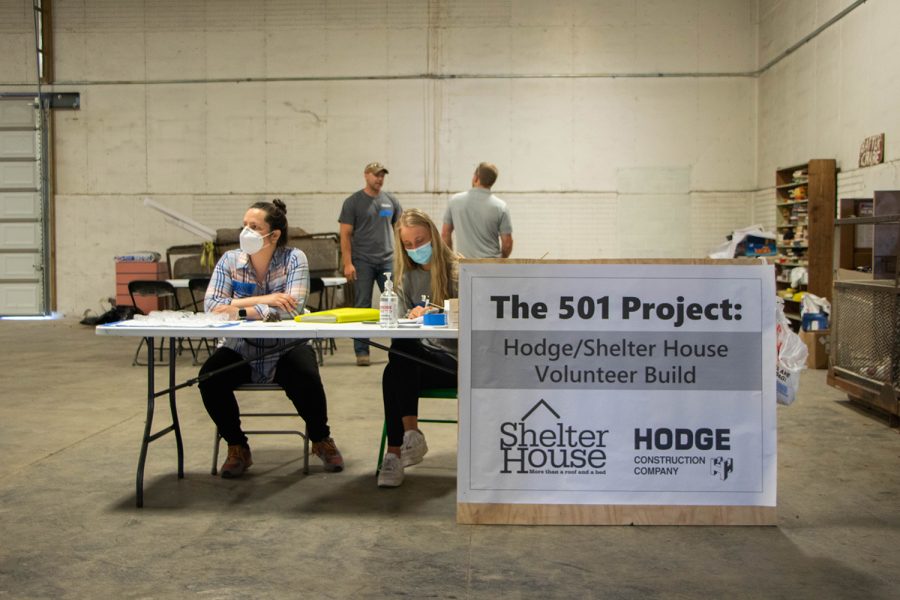Opinion | Be an advocate for the less fortunate
As cold months approach, everyone should advocate for for people experiencing homelessness.
Volunteers from Shelter House, Iowa Finance Authority, and Hodge Construction are seen building walls for the 501 Project on June 17, 2021 in Coralville. The 501 Project will bring the community a “housing first” shelter for people experiencing homelessness.
November 3, 2021
Many enjoy the winter months because it means curling up and getting cozy from the comfort of their homes. Winter is a time for celebrating holidays with family and friends and staying warm inside. However, this is not an option for someone without housing or shelter.
People experiencing homelessness in the wintertime face cold weather, snow, ice, and less daylight. As the winter months approach, we all need to advocate for people experiencing homelessness by showing compassion, educating ourselves, and donating.
“The needs for wintertime impact the people who fall into literal homelessness,” said Christine Ralston, director of development and communication at Shelter House in Iowa City.
According to the U.S. Interagency Council on Homelessness, an estimated 2,647 Iowans experienced homelessness in January 2020. The issue of finding shelter for people without housing is greater in the pandemic because many public spaces are closed because of COVID-19 precautions.
It is easy to forget the luxury of having stable shelter for those who have never experienced homelessness, but the issue of homelessness is both urgent and complicated.
“You can’t solve all problems with money,” Ralston said. “There are policies on all levels that contribute to a person experiencing homelessness. There will always be a need for more money in the community. But money alone will not solve the problem.”
And she’s right. The problem of homelessness itself is intertwined with policies that make it harder for people to find permanent housing, economic barriers that set people back, and other issues that deepen the scope of homelessness.
While there is not one, easy solution, one way we can help is to act as advocates for people experiencing homelessness.
Another way to help is by showing compassion.
Too often, society refers to people experiencing homelessness as “the homeless.” This word is dehumanizing, characterizing people as an issue and not as a person. The label is harmful to people experiencing homelessness, because the word “homeless” carries a negative connotation which reinforces harmful stereotypes.
We need to have compassion for people experiencing homelessness, especially as cooler months approach. While homelessness is an urgent social issue, we need to remember that the people who are impacted by it are not the issue.
We also need to educate ourselves on homelessness.
City officials regularly receive calls from individuals reporting on people experiencing homelessness. But city officials should not be who we call first when we see someone in need of support.
Ralston advises people to call Shelter House street outreach and engagement services, which is meant to divert calls for service from police to someone better suited to respond.
“Everyone having access to information is key,” Ralston said. “Better assisting people experiencing homelessness is crucial in finding paths to long-term housing.”
Last, advocate by giving what you can.
While money alone cannot solve the issue of homelessness, it assists in finding long-term solutions to homelessness. Programs like Shelter House are funded through grants and donations. Donating to such programs can help people in need in your community find the help they need.
This also includes donating items. Donations are especially important in winter months where items like winter coats, hats, sleeping bags, and blankets are needed. However, donations are needed year-round to provide everyday items like toothpaste, toilet paper, and store gift cards.
If monetary or physical donations are not possible, people can also donate their time through volunteering. Many organizations offer services and programs like language training, job labs, support, and group projects.
For people experiencing homelessness, the future can often look dim and uncertain. Though there is no single solution, being an advocate for the less fortunate can go a long way in supporting the lives of many.
Columns reflect the opinions of the authors and are not necessarily those of the Editorial Board, The Daily Iowan, or other organizations in which the author may be involved.



